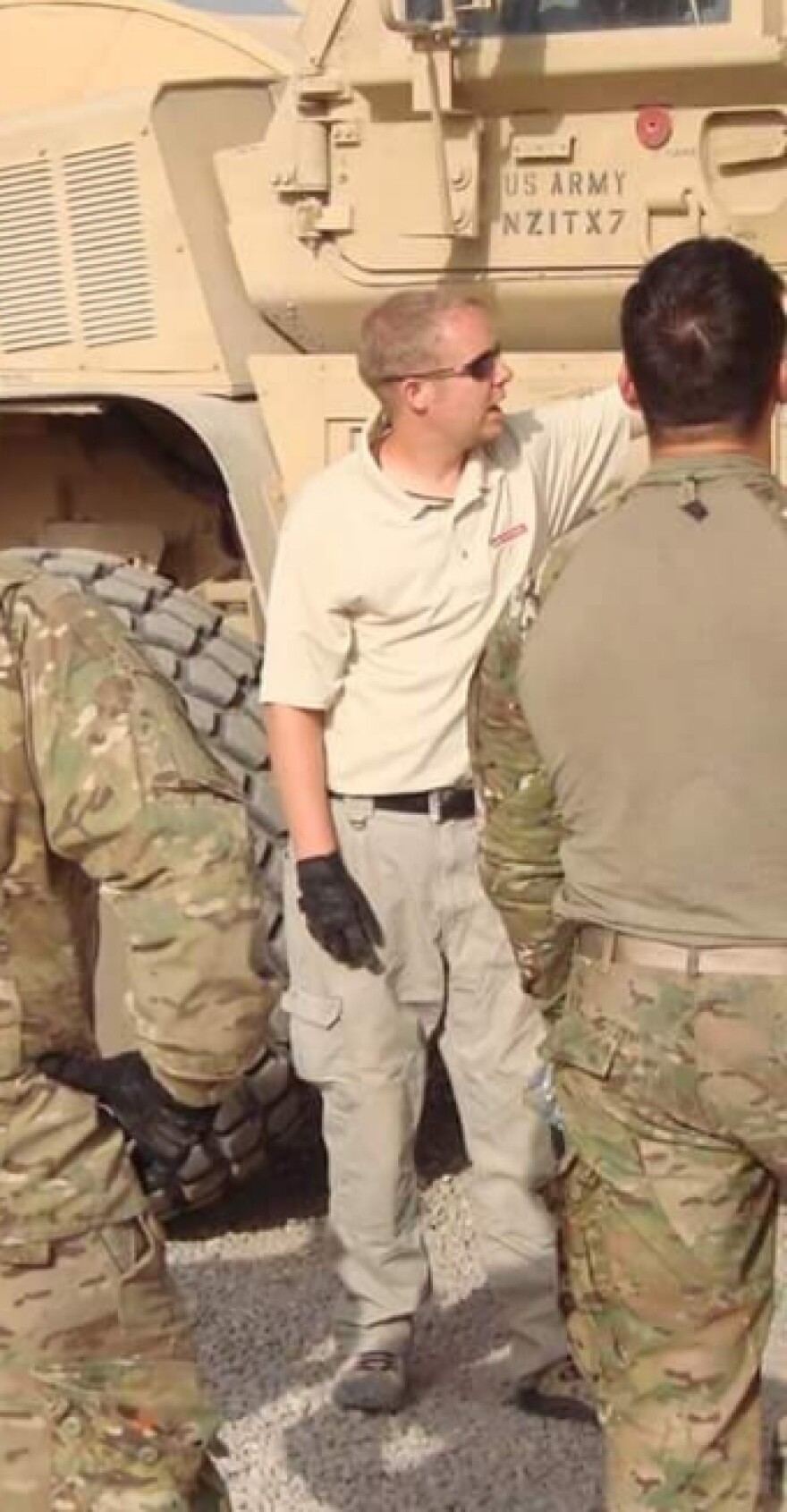As part of River to River's Leaving Afghanistan series, Ben Kieffer spoke with Shawn Vodenik. He's a native of Perry, now a resident of Bondurant, a former member of the U.S. Army Reserve who was also active duty army from 2002 to 2007. Vodenik served in Afghanistan in 2010 and 2011 as a military contractor.
"Yeah, I loved G.I. Joe and all my family members were prior service. And so it just kind of seemed like the thing I needed to do. And it was just, it was a perfect fit for me.
"[Iowa] doesn't really have an active duty, you know, environment here. There's no culture here for active duty. So we don't have an active duty base or anything like that. So I wasn't sure what I wanted to do in the military. And I wanted, I thought I wanted, to stay here in Iowa. So it seemed like a good fit to go into the Army Reserve or National Guard. I chose the reserve route.
"I was a Cavalry Scout, so I was on Bradleys and everything like that. The individual that was my instructor on the Bradley actually connected with me once I got out and asked if I wanted a job to teach the Bradley. And so I jumped at that opportunity. And as soon as I met with his boss, they explained that they knew MRAPV or the mine-resistant ambush-protected vehicles were surging across Iraq and they needed trainers for that. And I just said, 'yeah, I can do that as well.' I didn't know what an MRAPV was, but I'm sure I could figure it out. And after about three months of training, learning everything about that vehicle, between reading schematics and putting, you know, hands on the vehicle day in and day out, becoming a subject matter expert. Shortly after that, went off to Iraq a year. And then upon my return in 2009, I traveled all across the U.S. teaching it to Special Operations Command for their particular variant of the vehicle. And then in 2010, I went out to Afghanistan to become the site lead for Herat. And then I became program manager for the entire vehicle from Herat down to the Helmand province."

"That is the R.G 33 model of the MRAPV. And there were close to about 12 different types of maps, all different brands, all different contractors were out there teaching their variant of the MRAPV.
"It was a solution to the problem that IEDs posed, improvised explosive devices. So with a V-shaped underbody, it would direct the blast out and away from the vehicle, keeping the occupants inside relatively safe. There was just a, you know, constant change in the tactics that the enemy was using with the IEDs. And so the, the implosive solution ...
Kieffer: Mm hmm. And you say mostly, so inside ... If you were inside, I don't know if you've been in an MRAPV when it's hit an IED or can recount what that's like. I suppose it depends on the blast force of the IED, whether that fully protects the occupants.
"So when there was a concussive force of any substance, it would blast up and rattle the inside of the vehicle and cause a lot of internal injuries to the occupants as well. So with a V-shaped underbody, it would allow the blast to be directed out in a way, as opposed to all that concussive force hitting directly underneath the occupants. So it was a ... it saved a lot of lives. It's used mainly for transport, but it will have weapons mounted on the top as well that can hold a Mark -19 grenade launcher or M2 50 cal. You know, basically any weapon can be mounted to the top of that."
"All the U.S. armed forces, so Navy, Marines, Army, Air Force. Anybody that's going to be operating those vehicles. We also had quite a few foreign troops, British and other allies would be receiving these vehicles as well or be riding in the vehicles. And they wanted the training so they could operate it. And, you know, if they need to.
"I wanted them to be confident with the equipment. You know, if you're in a war zone and you know, you've just arrived, you hit the ground running, and now you're being issued this giant vehicle that is unlike anything that you've ever seen or ridden on or operated. So it was my job to help them gain confidence with the equipment, let them know why they want to use this vehicle and why it's better than what they were previously accustomed to with the Humvees.

"I was at a coffee shop in Afghanistan, and this young soldier comes up and you know, he said, 'Mr. Vodenik, I just want to say thank you.' And I was trying to remember where he was from. And then I recollect he was a part of one of my first classes I ever had. And he said they were in the middle of a firefight. And I guess my voice just came on in his head on how to engage the four-wheel drive, what switches, which order they needed to go. And he said, 'I could just hear your voice in my head as I was flipping those switches while everything else was rattling around us due to the gunfire.'"
"I remember when I was a soldier in Iraq and we always looked at the contractors as that, you know, that third person, that person that just makes more than us, that, you know, that don't know quite what they do and whatnot. And then when I was in Afghanistan, it was a total flip, because now I am that person that I, you know, like I [was] looked at as the third person. But the amount of support that we receive in Afghanistan from even the allies, the British military over on Camp Bastion, which is over and a --oh where's that? --The Helmand province. They were just fantastic and supportive. They let us use their training sites for our training. And it was just, it was definitely that sense of one team, one fight. Everybody's, everybody was in it together.
"I think a lot of people have that misconception that if you're a contractor you're some sort of hired gun or some mercenary, and that's such a small, small contingent, a small fraction of the individuals that are overseas that are supporting the war effort. Contractors run literally the base. Every base that you go to is swarming with contractors that do everything from sewage to trash pickup to food service to, in my situation, I was just, I was an instructor. I trained military personnel on equipment. We have mechanics. We have everything that has to do with day-to-day life throughout Iraq or Afghanistan or anywhere. You're going to find contractors that are doing it.
"As contractors, our job is to support the warfighter. And so the military can focus more on the mission on why we're there."
"We did a lot of good there, and I think the the good outweighs the bad of of what we accomplished. And every theater of operation that we've been in, you know, as far as us pulling out, that needed to happen. We can't be there forever. Twenty years ... this is a long time to support another country. And I see it as if we've been training the Afghan military for 20 years, trying to build them up and get them the resources they need, the equipment they need. And, and now it's the ball's in their court. They need to, they need to get it together. And if they don't have the support of their own people, you know, it's just apparently the people are choosing the Taliban. You know, is it out of fear or is it out of what the Taliban offers and the government cannot? I don't know.
"I mean, war has been part of their life for longer than we've been there. You know, obviously the the Soviets had invaded in the 80s and and they were there for a very long time. So war is just kind of part of their day-to-day life. And you know what we consider to be just unbearable living conditions has been their life. They don't know any different life than what they've been living for the past 20 years. And when you really think about it, I mean, 20 years of us being there, that means there was, there were soldiers on the ground in Afghanistan that, you know, weren't even born yet when 9/11 happened. So, I mean, for them, Afghanistan, which is something that has always been. And it's much the same with the Afghan civilians. It just, you know, for a lot of the younger generation having a military foreign military on on on their soil has just been their way of life.
"My heart goes out to [Afghanistan citizens] 100 percent. I, I do feel as if we we just kind of abandoned them, which is really sad. That really hurts. I wish we could do more. I don't know what solution we could possibly provide. A shortage is bringing them over to America. But is that something that they want? You know, they worked really, really hard to try to secure a future for their own country. And, you know, throwing in the towel, that that would just be. Yeah. My heart just goes out for them.
"It would be wonderful if we treated the Afghan population the same way that we we treated our allies in Vietnam, if we could just bring them over. That would be wonderful."





